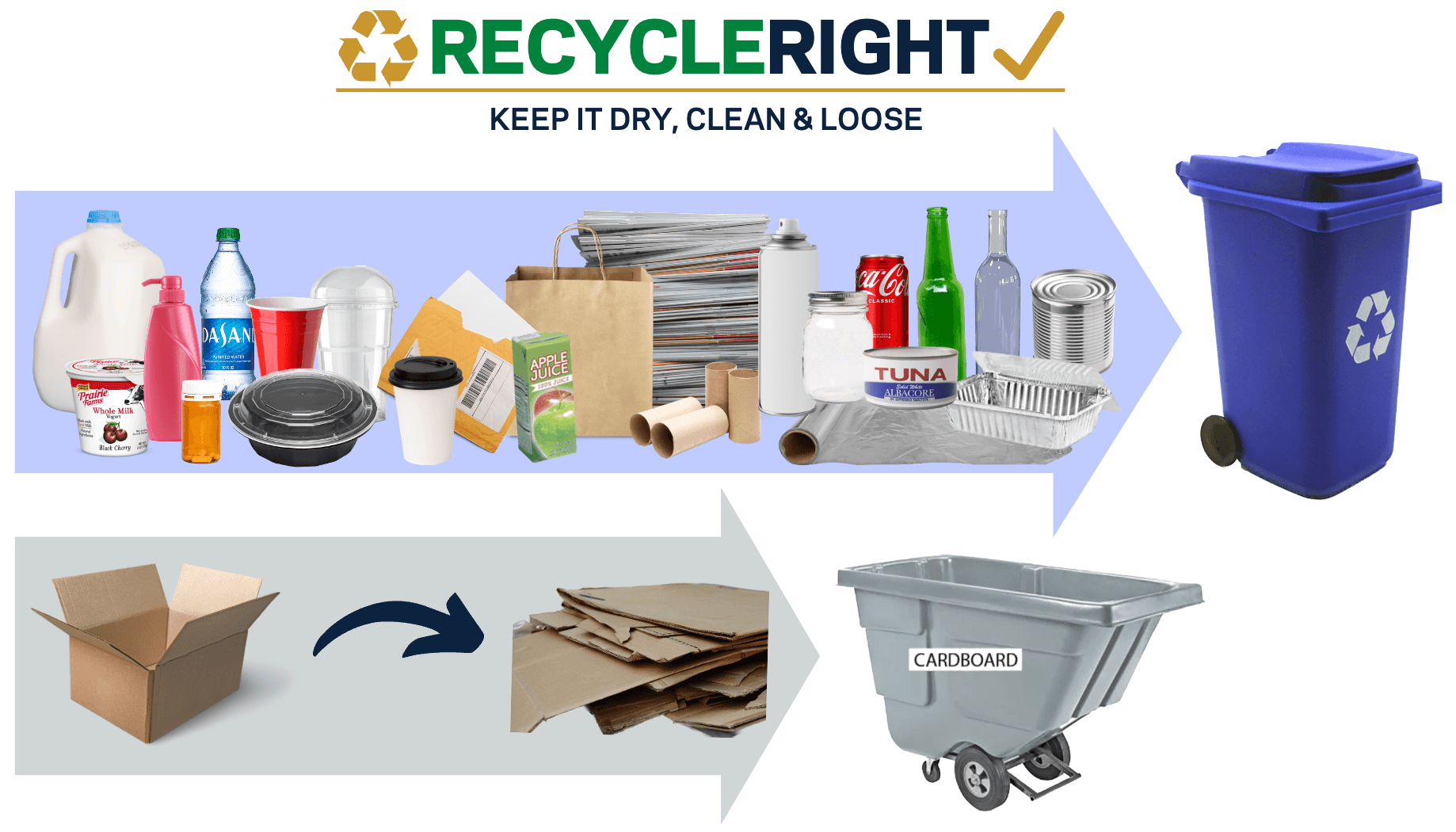
Guided by the principles of Laudato si’ to be good stewards of our common home, the University has prioritized waste diversion. Operational departments have been working diligently to improve this complex system and expand recycling collection across campus. While our recycling program has evolved over the past year, the temporary hiatus of recycling collection in 2020 presented challenges that still impact the process.
“We are focused on recycling and are incredibly committed to making the process here at Notre Dame as streamlined and efficient as possible,” says Vice President for Campus Safety and University Operations Mike Seamon. “We also know this is a team sport – and we ask partners across campus to join us in making this a priority, while we continue to enhance our process.”
The current state of recycling on campus
The single-stream toter system and cardboard collection carts continue to be the primary way we collect everyday recyclable materials on campus. It works just like your municipal recycling pickup at home. As you collect materials in a personal bin, those items are transferred to the toter for centralized pickup each week by our servicer, Recycling Works. We ask all members of the campus community to help us eliminate non-recyclables from our recycling stream, such as plastic bags you may use to collect your recycling.
“The global market for recycling changed dramatically in the last six years, and we’ve all had to adapt. This is not an easy challenge to overcome, but the success of expanding the [recycling] program relies on each of us, as we all play a part in reducing waste and working together to care for our common home,” says Senior Director of Sustainability Geory Kurtzhals.
As the program expands, toters are becoming more visible to the campus community for greater access to recycling collection.
“Toters help us to respond to the industry requirement to exclude plastic bags from our process. Recyclables must be received by our recycling partner loose,” Senior Director of Building Services Chris Hatfield says. “Plastic bags cause problems with processing equipment and are not accepted. This system mimics the residential recycling pickup program you probably use at home. Blue rolling toters are picked up on a regular basis, and we rely on all members of the campus community to make sure their loose recyclables make it into that single receptacle.”
Accepted materials have recently expanded for enhanced diversion opportunities. In particular, a greater number of plastics are now accepted through our servicer. Other materials, such as University-owned or campus-generated batteries, are recycled through specialty recycling pickup requests: https://fixit-ready.nd.edu/ready. The A-Z Recycling Directory offers a searchable database to learn how to dispose of numerous materials both on and off campus.
In line with the expansion of accepted material types, updated graphics have been developed to coincide with these improvements to help the campus community navigate the changes.
Recycling accessibility improvements coming this academic year
We’ve been listening to what you have to say about recycling at Notre Dame. Throughout the 2023-24 academic year, the University will phase in an updated approach to improve accessibility and reduce contamination. The following updates are scheduled to occur:
-
As of August, all residence halls have recycling available on every floor when space allows and an elevator is present. Students are still responsible for emptying unbagged recyclables from their personal bins into the centrally located toters within their residence halls.
-
Starting in August, DeBartolo and O’Shaughnessy Halls are piloting academic space updates, which include moving trash and recycling bins from inside classrooms to centralized recycling and landfill toters. This will create cleaner classroom spaces and streamline waste pickup.
-
In academic spaces, common area bins are going away and being replaced with centralized stations: recycling toters paired side-by-side with landfill bins. To support a more effective recycling process, small bins currently located in common areas like copy rooms, classrooms, labs, kitchens, etc., are being removed. This process began in 2022 and continues today. See the list of locations to find a toter nearest you. Personal desk-side recycling bins will still be available. Occupants are encouraged to empty their personal bins into centralized waste collection bins and recycling toters between scheduled service intervals. If you have mobility limitations and require assistance dumping your personal bin, please contact your building manager for accommodations. Overall, this change helps to reduce material contamination and ensure consistency for recycling across campus.
-
The current aesthetic of open-air toters is not the final product. As we continue to identify the recycling needs across campus, attention will be given to how to best blend toters into the aesthetics of our beautiful campus and its unique collection of buildings. Toter enclosures are currently being tested in three locations within DeBartolo Hall.
Changes to the recycling program are not a closed-loop system; we are eager to hear from the campus community. Stay tuned for opportunities to provide feedback on the program and attend listening and learning sessions coming later this fall.
Originally published by at green.nd.edu on September 12, 2023.